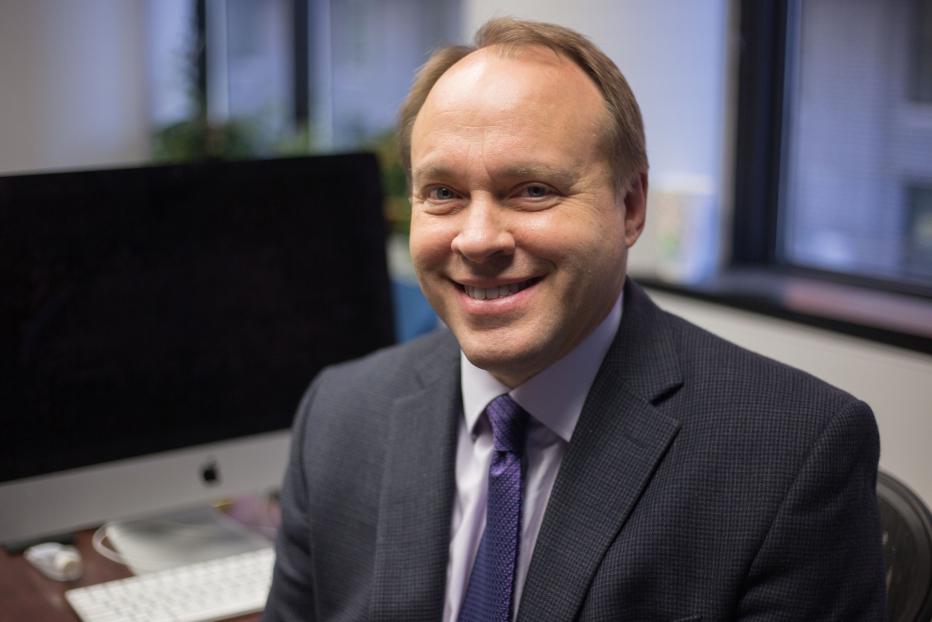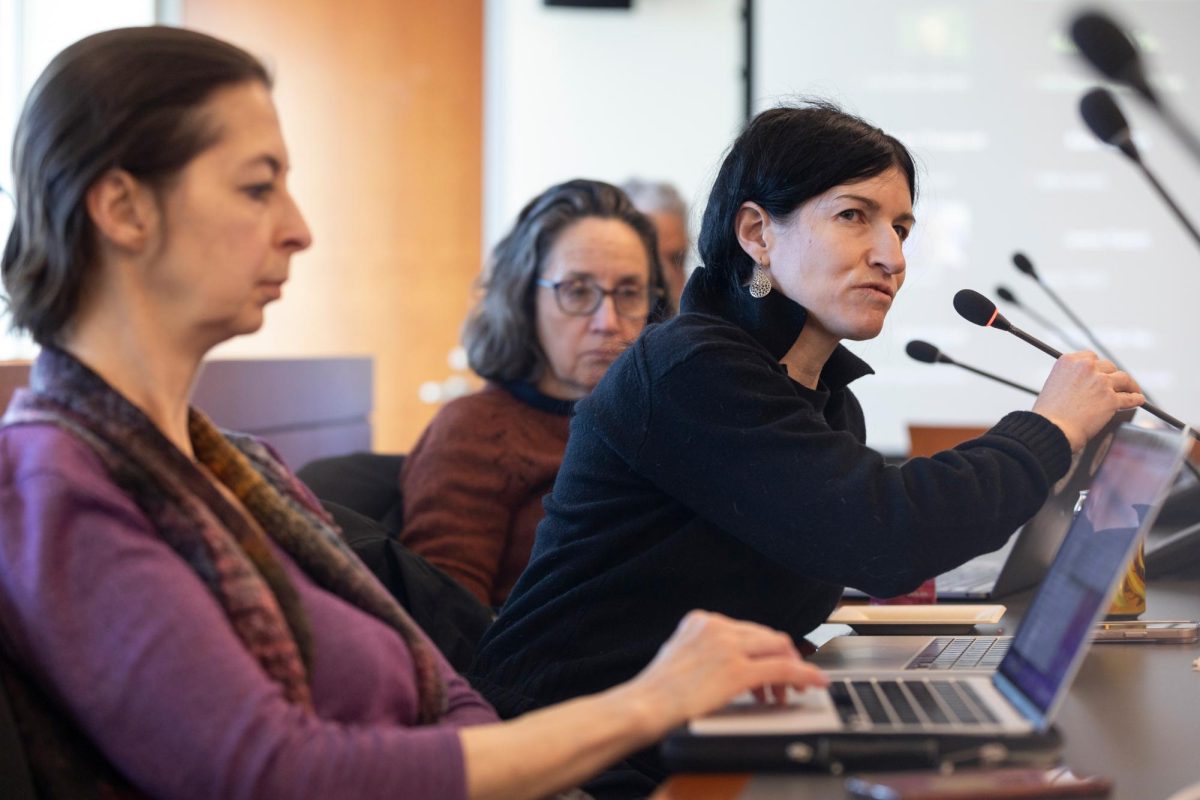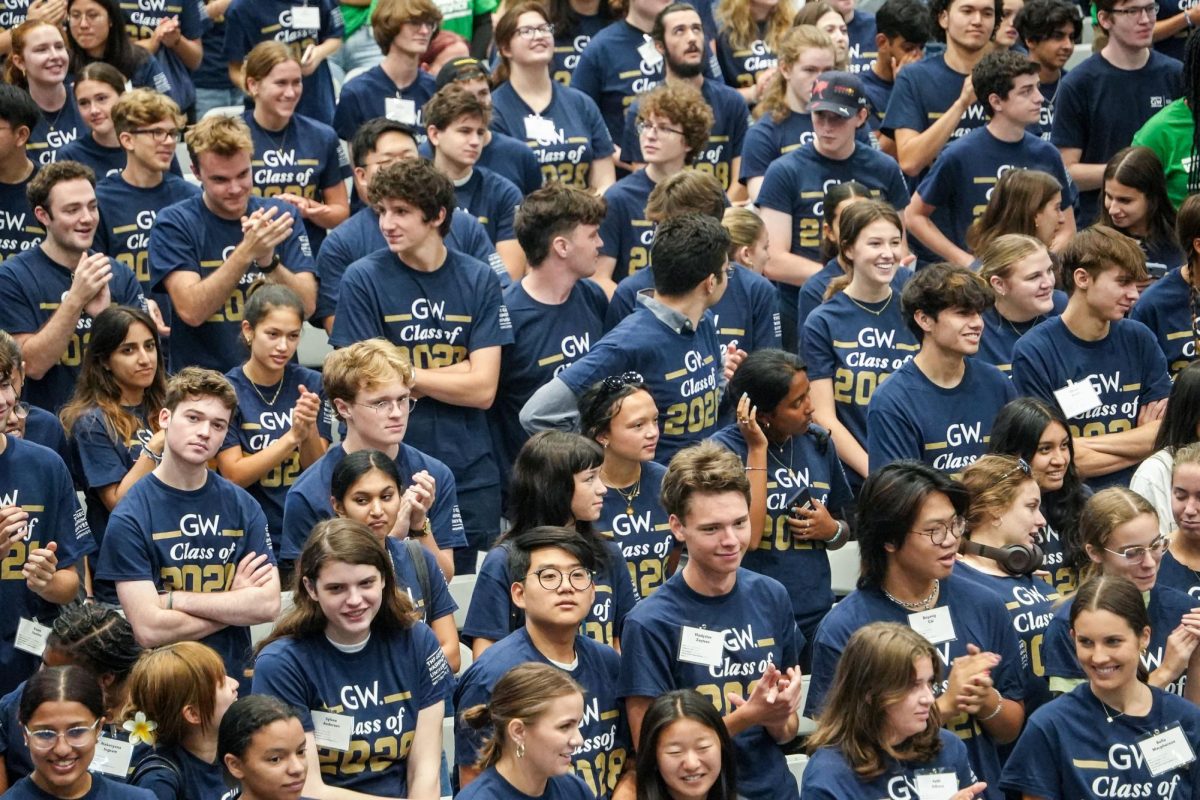Updated: Nov. 10, 2020 at 10:41 a.m.
When Paul Wahlbeck was serving as the chair of the political science department in the early 2010s, he would take faculty candidates for the department past a hole in the ground that would become the Science and Engineering Hall every morning.
He called the hole the “most important development on campus” for the Columbian College of Arts and Sciences, adding that bolstering the school’s sciences would move GW “comprehensively in a stronger direction.”
Since the hall’s creation in 2015, Wahlbeck has become the school’s permanent dean and said he hopes to ramp up efforts to strengthen GW’s STEM offerings and diversity, equity and inclusion initiatives in his role for the school. He said though the COVID-19 pandemic has shifted his initial goals as dean, he is still working to strengthen CCAS’ educational and course offerings.
“In this moment in our nation’s history with the unrest that exists around race and racial politics, this is a priority for the college, and we will make progress on it despite the pandemic.”
Time as interim dean
Officials announced in July that Wahlbeck would take over as permanent head of CCAS after he held the position in interim for two years. As interim dean, he oversaw the development of the data science major, short-term study abroad opportunities and “collaborative team teaching” between STEM and other faculty.
Wahlbeck said Ben Vinson, the former CCAS leader who stepped down in 2018, established “visionary leadership” in the school, and Wahlbeck wanted to focus his time as interim dean on maintaining the progress that Vinson had set for the college.
“But I think that more specifically, that’s a caretaker role, and that’s not necessarily the kind of thing that really is what one would aspire to as an interim dean,” Wahlbeck said.
He said his goals as interim dean were in line with University President Thomas LeBlanc’s goals to improve the undergraduate experience, enhance GW’s research and scholarship, engage with alumni and strengthen philanthropic outreach and improve GW’s institutional culture.
Wahlbeck said he was also interested in building on Vinson’s vision of the “engaged liberal arts,” by pushing students to apply knowledge gained in the classroom to real-world experiences through short-term study abroad programs.
“I think that those are fascinating opportunities to take our knowledge and to push it further than what we’ve been able to do in the classroom and simultaneously push our students out of their cultural comfort zones at the same time,” Wahlbeck said.
He said he also wanted to increase rankings for various doctoral programs in CCAS and created “bulletins” — where officials could publicize the accomplishments and successes of students and faculty to faculty at other universities, which would develop a “stronger reputation and stronger rankings” for the school’s programs over time.
Wahlbeck said as chair of the political science department and later the vice dean for programs and research of CCAS, he had the opportunity to work with several faculty members and listened to the perspectives and insights of faculty, staff and students in CCAS.
“I could see their commitment to their students and to their programs, and it was clear that it was a real privilege to be surrounded by so many caring and committed faculty members, staff members and students all pushing in the same direction,” Wahlbeck said.
The COVID-19 pandemic
Wahlbeck said the pandemic has caused him to “shift course” for his plans as the permanent dean and change the focus of his broader goals like those relating to diversity and inclusion. He said officials paused the process of hiring the school’s first director of diversity, equity and inclusion after officials implemented a hiring freeze in March.
Wahlbeck said officials are still pursuing the advancement of diversity, equity and inclusion in CCAS through workshops and roundtable discussions about racism and inequality and partnerships with the Office for Diversity, Equity and Community Engagement to teach faculty about how to create more inclusive classrooms and course curriculums.
“In this moment in our nation’s history with the unrest that exists around race and racial politics, this is a priority for the college, and we will make progress on it despite the pandemic,” he said.
Wahlbeck said when he moved into his role as interim dean, he was surprised by how much he enjoyed interacting with alumni and discussing their experiences at GW and their life after college. He said despite the pandemic, officials continue to hold virtual speaker events where alumni discuss their careers, like a September event in which two alumni who work as reporters discussed their insights on the 2020 election.
He said although the pandemic has caused alumni events to be held virtually, event attendance has increased and officials have been able to engage with more alumni than in the past.
“From my vantage point, that’s a real win,” he said.
Wahlbeck said the economic impact of the pandemic has affected some alumni negatively who haven’t been able to donate as much as they used to but added that officials have encouraged alumni to volunteer their time through virtual mentoring events for students.
“There are so many ways that we can engage with alumni,” he said. “Fundraising is one piece of it, but we can actually double down on other forms of engagement during a time of economic downturn where some people aren’t able to contribute financially to the University.”
Plans for the future
Wahlbeck said his role as dean is to “think strategically” about the future of CCAS, and the pandemic has highlighted questions for him about the future of higher education, the role of virtual learning among graduate programs and future course and program offerings for GW.
He said although GW’s strategic planning process is on hold, he wants to improve the school’s STEM offerings.
Officials paused the strategic planning process in April amid rising concerns surrounding the pandemic’s financial impact on the University. It included plans to reduce undergraduate enrollment by 20 percent and increase the proportion of STEM students to 30 percent.
“This is a time for thinking about how to build the sciences in Columbian College so they’re really positioned to contribute to our preeminence as a comprehensive global research university,” he said.
Wahlbeck said as dean, he values hearing about student perspectives on issues like the Pass/No Pass policy and the push for Election Day to be declared a University holiday.
“I think the thing that going forward that’s going to be very valuable for us to hear, especially now that we’ve had a full semester of being in a virtual learning experience, is what challenges are students facing, and what can we do to help students navigate those challenges?” Wahlbeck said.
This story has been updated to correct the following:
An earlier version of this story stated Wahlbeck oversaw the development of the data science major as interim dean in 2015. He was not interim dean in 2015 but oversaw its growth in subsequent years. It is now corrected.








